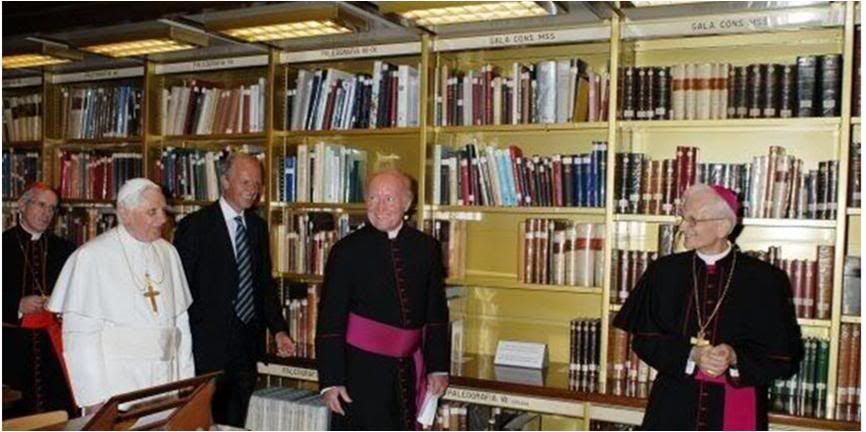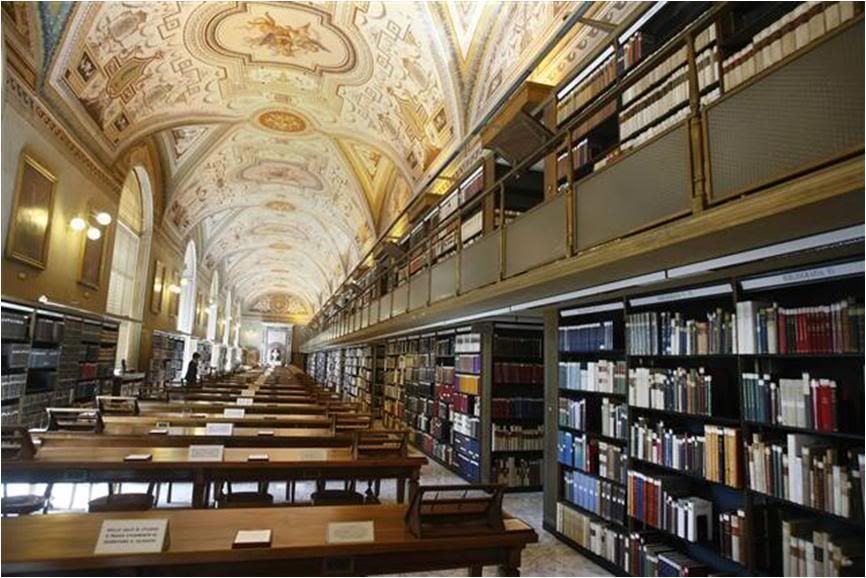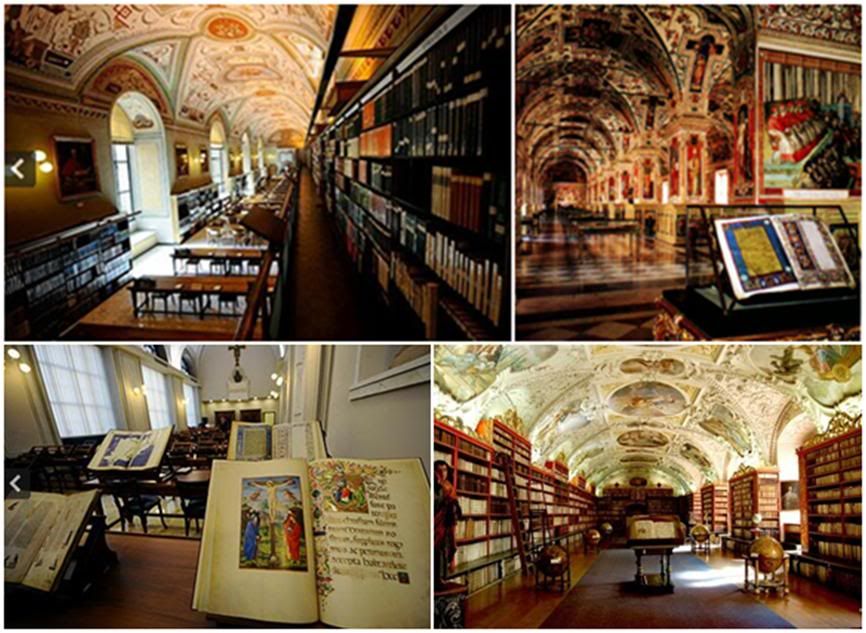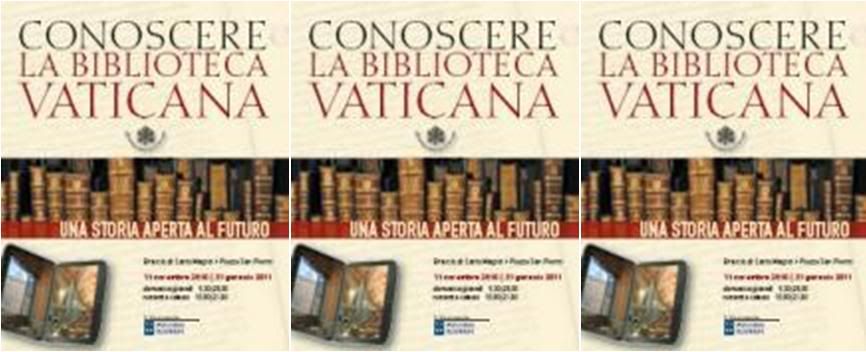| | | OFFLINE | | Post: 21.441
Post: 4.077 | Registrato il: 28/08/2005
Registrato il: 20/01/2009 | Administratore | Utente Master | |
|
 Here is a message from the Holy Father that I failed to translate on time - also an opportunity to give the proper attention to the recent re-opening of the Vatican Library. This is the full translation of the letter from Benedict XVI to Cardinal Farina for the occasion....
THE VATICAN LIBRARY:
Here is a message from the Holy Father that I failed to translate on time - also an opportunity to give the proper attention to the recent re-opening of the Vatican Library. This is the full translation of the letter from Benedict XVI to Cardinal Farina for the occasion....
THE VATICAN LIBRARY:
Words as a path to God
 The Holy Father visited the Vatican Library in June 2007 just before it closed down to regular visits for a three-year renovation which was completed recently. At right is Cardinal Farina, then Library Prefect, whom he named shortly thereeafter to be the Archivist-Librarian of the Holy Roman Church, after he had named Cardinal Jean-Louis Tauran (behind the Holy Father) to be president of the Pontifical Council for Inter-Religious Dialog. Below, the main research hall of the Vatican Library.
The Holy Father visited the Vatican Library in June 2007 just before it closed down to regular visits for a three-year renovation which was completed recently. At right is Cardinal Farina, then Library Prefect, whom he named shortly thereeafter to be the Archivist-Librarian of the Holy Roman Church, after he had named Cardinal Jean-Louis Tauran (behind the Holy Father) to be president of the Pontifical Council for Inter-Religious Dialog. Below, the main research hall of the Vatican Library.

To my Venerated Brother
Cardinal RAFFAELE FARINA, S.D.B.
Archivist and Librarian of the Holy Roman Church
The re-opening of the Vatican Library, after three years of closure for important renovations, is being celebrated with an exhibit entitled "Getting to know the Vatican Library: A history open to the future", and with a conference on the theme of "The Vatican Library as a place of research and as an institution in the service of scholars".
I am following this initiative with particular interest, not just to confirm my personal closeness as a man of studies to this worthy institution, but also to continue the centuries-long and constant interest that my predecessors have shown for it.
One of the two epigraphs placed by Pope Sixtus V near the entrance to the Sistine Hall of the Library recalls that it had been begun - inchoata - by the Popes who had listened to the voice of the apostle Peter.
In this idea of continuity in a bimillenary history there is a profound truth: The Church of Rome, from its very beginnings, was linked to books. First, they were those of the Sacred Scriptures, and later, theological books and those related to the discipline and governance of the Church.
Indeed, since the Vatican Library was born in the 15th century, in the heart of Humanism, of which it is a splendid manifestation, it is the expression, the 'modern' institutional realization, of a much more ancient reality that has always accompanied the Church on her journey.
Such historical awareness leads me to underscore how the Apostolic Library, like its adjoining Secret Archive, is an integral part of those instruments necessary to carry out the Petrine ministry, and like this ministry itself, it is rooted in the exigencies of governing the Church.
Far from being simply the fruit of the accumulation of a refined bibliography and of a collection with many possibilities, the Vatican Library is a precious means which the Bishop of Rome cannot and does not intend to give up, in order to have, when considering problems, that overview that is able to grasp, with a long-term perspective, the remote roots of situations and their evolution in time.
Eminent place of the universal Church's historical memory, which safeguards venerable testimonials of the written tradition of the Bible, the Vatican Library is the object of the Pope's care and concern for yet another reason.
It conserves, from its origins, the unmistakable openness - truly 'catholic' and universal - to everything that is beautiful and good and noble and worthy (cfr Philemon 4,8) that mankind has produced in the course of centuries. And from there, the largesse with which in time, it has gathered the most elevated fruits of human thought and culture, from ancient times to the Middle Ages, from the modern era to the 20th century.
Nothing which is truly human is alien to the Church, which has therefore sought, gathered, conserved with a continuity that has few paragons, man's best efforts to raise himself above mere materiality towards the search - conscious and unconscious - for Truth.
It is not by chance that in the iconographic plan of the Sistine Salon, the ordered succession of the Ecumenical Councils and the great libraries of the ancient world on its left and right walls, the images of those who invented alphabets on the central pillars, converge towards the figure of Jesus Christ, «celestis doctrinae auctor» = author of heavenly doctrine - alpha and omega, the true Book of life (cfr Phlm 4,3; Ap 3,5; 13,8; 17,8; 20,15; 21,27) - towards whom all of human labour tends and yearns.
The Vatican Library is therefore not a theological library or one that is predominantly of religious character. Faithful to its humanistic origins, it is by calling open to man. Thus it serves culture, understanding by that word - as my venerated predecessor, the Servant of God Paul VI, said on June 20, 1975, on the occasion of this institution's fourth centenary -
Human maturation...from within, an exquisitely spiritual acquisition, culture is the elevation of the most noble faculties that God the Creator has given man, to make him a man, to make him more than a man, to make him similar to him!
Culture and mind; culture and soul; culture and God. Even with this, 'her' institution, the Church re-proposes this essential and vital binomials which touch man in his truest dimension, and incline him, almost by an inversion of the law of gravity, upward, and demand of him... to go beyond himself according to the admirable Augustinian trajectory of quaerer super se - to seek beyond self ](cfr S. Augustini, Confessiones, X, 6, 9: PL 32, 783).
Even in the functioning of this, her institution, the Church re-promises to us today - as it did five centuries ago - to serve all men, inscribing his particular ministry in the much vaster framework of that ministry which is so essential to her in order to be the Church: the Church as a community that evangelizes and saves(Paul VI, Teachings, XIII [1975], p. 655).
This openness to the human being is not only towards the past but also in the present. In the Vatican Library all researchers of truth are always welcomed with attention and respect, without any confessional or ideological discrimination. All that is asked of them is the good faith of serious research that is disinterested and competent.
In this research, the Church and my predecessors have always wished to acknowledge and appreciate a religious motivation, often unconscious - because every partial truth is part of the Supreme Truth of God, and every rigorous investigation in depth is a path to reach the truth.
Love of the written word, historical and philological research, are thus interwoven into a desire for God, as I had occasion to point out on Sept. 12, 2008, in Paris, meeting with the French world of culture at the College des Bernardins, and re-evoking the great experience of Western monasticism. The objective of the monks was and continues to be
...'quaerere Deum', to seek God... Seeking God intrinsically requires a culture of the word... The desire for God, le desir de Dieu, includes l'amour des lettres, love of words, penetrating words in all their dimensions.
Since in the Biblical Word, God is on the way to us, and we towards him, we must learn to penetrate the secret of language, and understand it in its structure and its mode of expression. And that is why, precisely in the search for God, the profane sciences that show the ways towards language become important.
Since the search for God required a culture of the word, the library became part of the monastery to indicate the ways towards the word. For the same reason, the school, too, became part of the monastery, through which the ways were made concretely open.
The monastery serves eruditio, the formation and erudition of man - a formation with the ultimate objective that man may learn to serve God. (Benedict XVI, Teachings, IV, 2 [2008], p. 272).
Thus the Vatican Library is the place in which the most elevated words of man are collected and conserved - mirror and reflection of the Word, the Verbum that illumines every man (Jn 1,9).
I would like to conclude with the words that the servant of God Paul VI said on his first visit to the Vatican Library on June 8, 1964, when he recalled the 'ascetic virtues' that activity in the Vatican Library involves and demands - immersed in the plurality of languages, writings and words, but always looking at the Word, and through the provisional, continually seeking the definitive.
Of this austere and at the same time joyous asceticism of research, in the service of one's own studies and that of others, the Vatican Library in the course of its history has offered numerous examples, from Guglielmo Sirleto to Franz Ehrle, from Giovanni Marcati to Eugène Tisserant. May it continue to follow the path traced out by these luminous figures!
With my best wishes and with heartfelt appreciation, I impart my Apostolic Blessing on you, Venerated Brother, on the Prefect of the Vatican Library, Mons. Cesare Pasini, and all your co-workers and researchers.
From the Vatican
November 9, 2010

 Above, The Sistine Hall entry, and the exterior of the Library facing the Belvedere courtyard in the Apostolic Palace complex. Below, various sections of the Library.
Above, The Sistine Hall entry, and the exterior of the Library facing the Belvedere courtyard in the Apostolic Palace complex. Below, various sections of the Library.

 Poster for the current exhibit which features meticulous facsimiles of some of the most unusual and beautiful manuscripts in the collection of the Vatican Library.
Poster for the current exhibit which features meticulous facsimiles of some of the most unusual and beautiful manuscripts in the collection of the Vatican Library.
[Modificato da TERESA BENEDETTA 15/11/2010 12:19] |